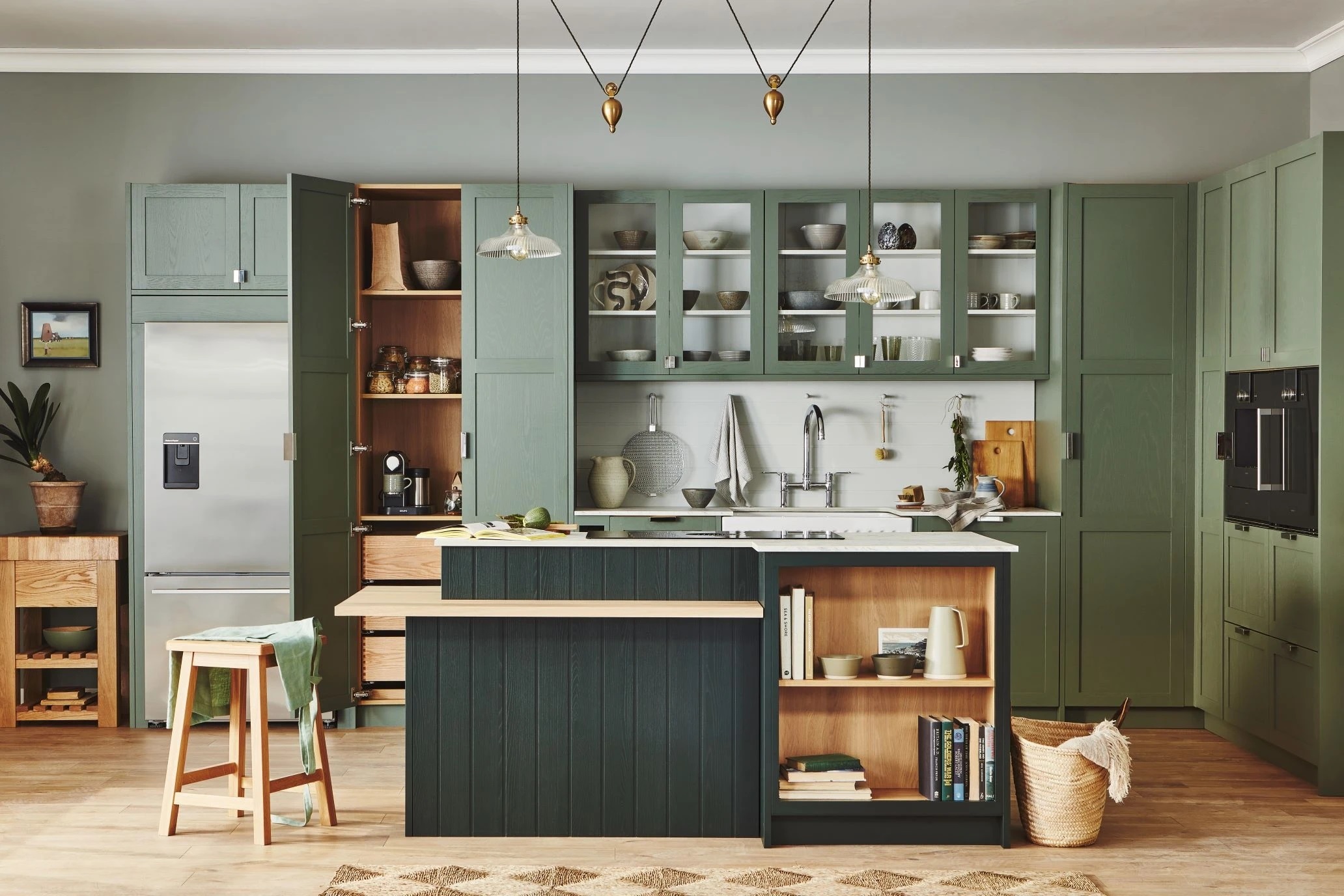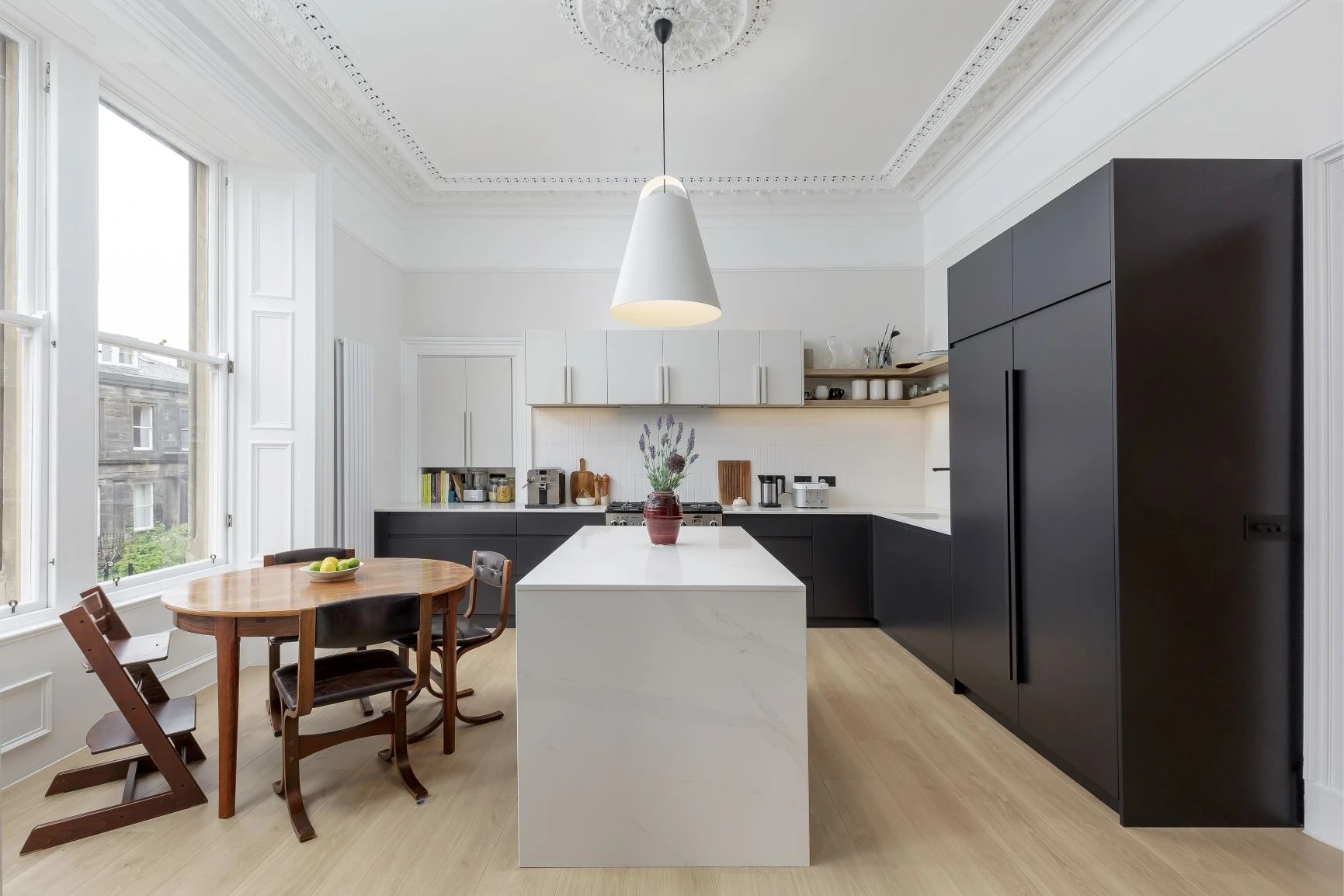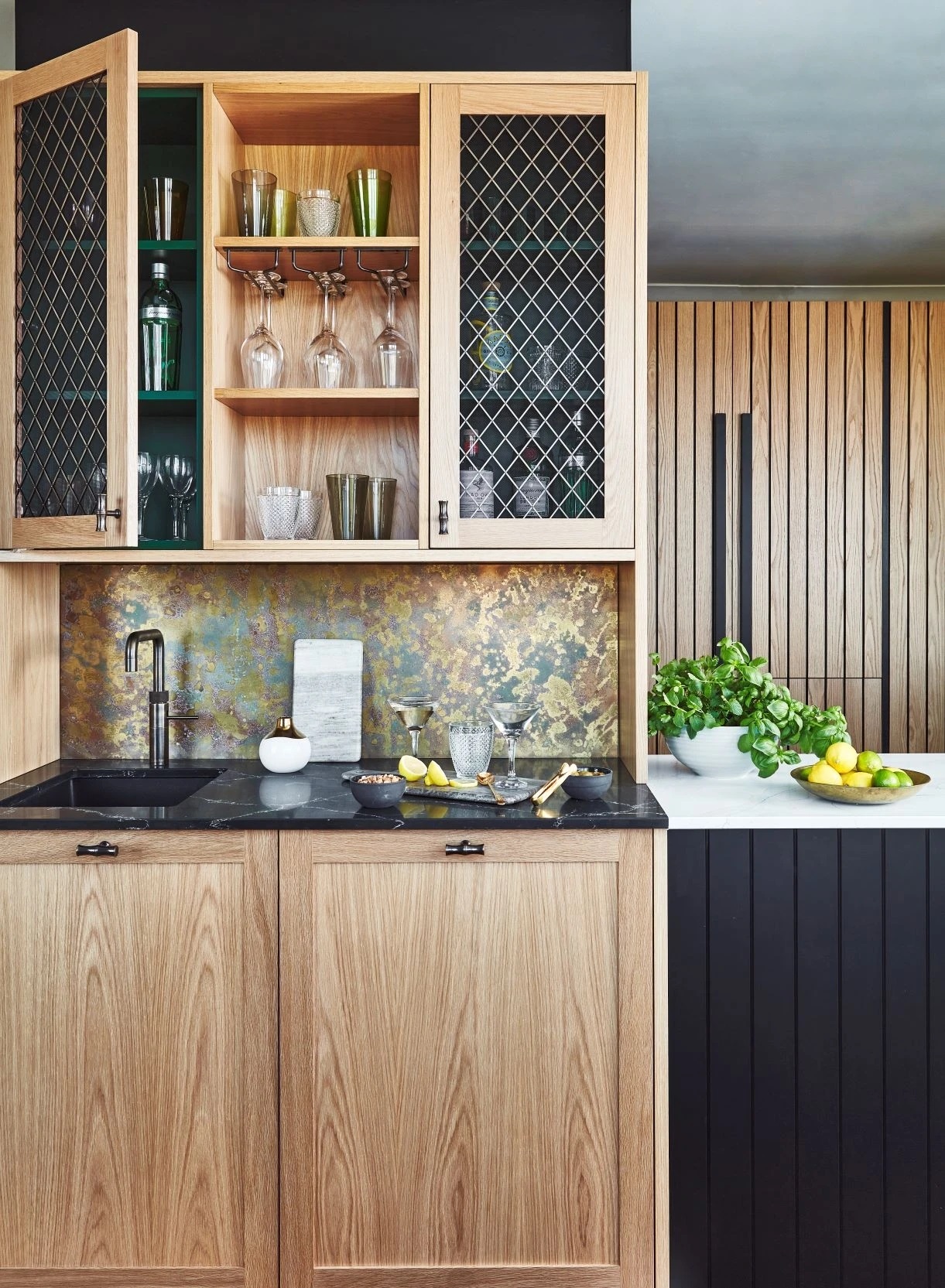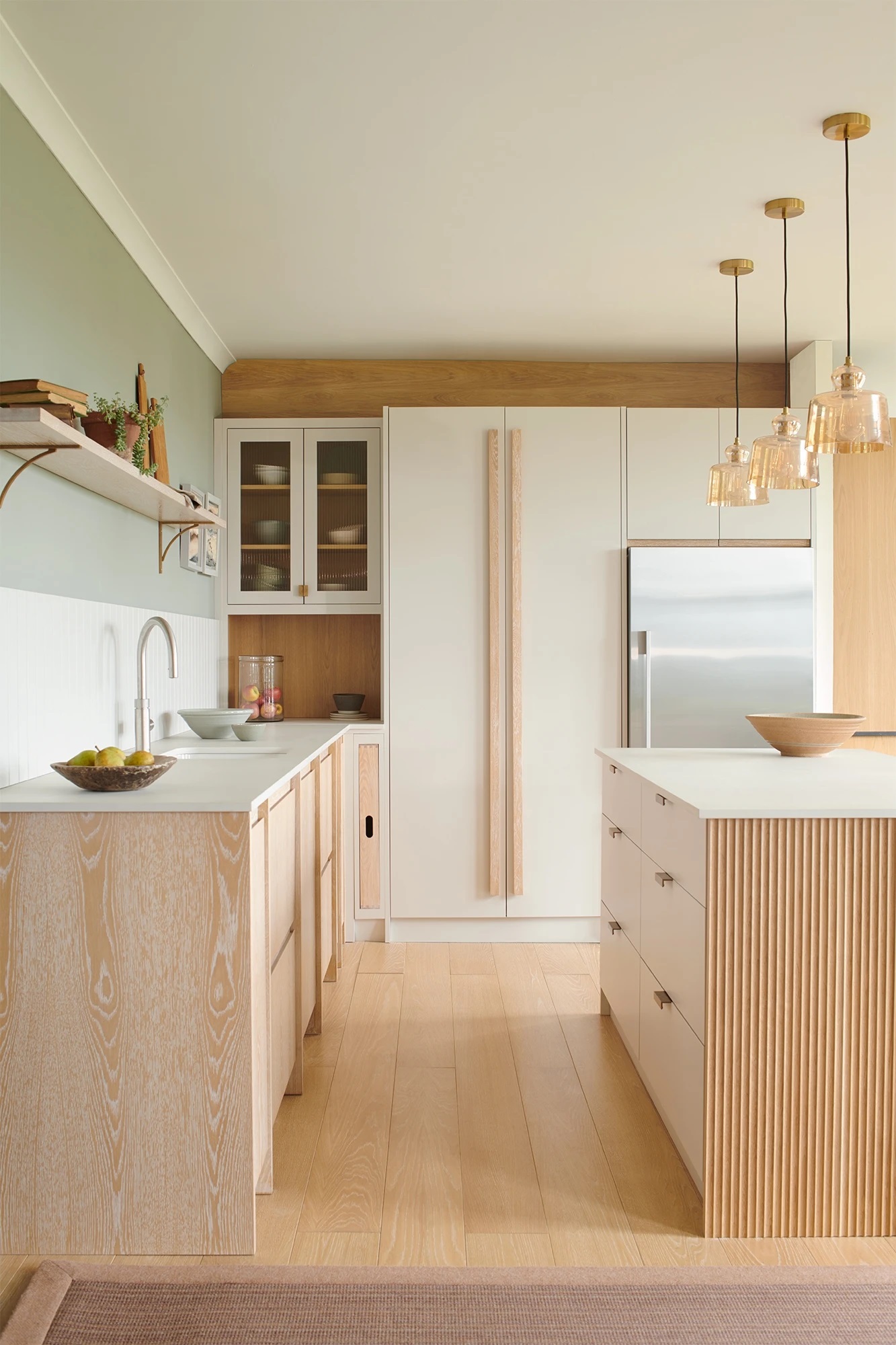
Combining different styles of cabinet is a brilliant way to create visual variety and stamp your unique personality on a kitchen. From pairing different styles of cabinet door, to mixing and matching colours, materials and finishes, here’s an expert guide to inspire your dream bespoke kitchen…
Is it ok to mix and match different cabinet styles in a kitchen?
Tradition and conventional thinking about kitchens might say that the floor and wall cabinets should match throughout the space, for a cohesive look. But rules are there to be broken – and mixing and matching different cabinet styles, colours and materials can add real depth, character and individuality to a space – and a kitchen that combines different styles can look sensational.
What’s the best way to combine different kitchen cabinet styles?
Whether you’re just looking to style things up a bit, or you want to make a big, bold statement, here are some of the ways you can combine different kitchen cabinet styles for visual effect:
1) Combine different colours – using different coloured cabinets can add depth and drama to a kitchen. For a subtle effect, try featuring different tones of a single colour; or for a bolder look, choose a striking two-tone colour scheme, or include a colourful kitchen island.
2) Mix modern and traditional styles – try combining traditional Shaker style doors with contemporary slab doors, mixing in-frame and frameless cabinets, or blending classic door and drawer handles with handleless options
3) Use different materials and finishes – mix natural wood grain with painted cabinets, glazed units or high gloss modern finishes, for added visual ‘texture’.
Mixing and matching kitchen cabinet styles: some top tips
We all know that rules were made to be broken - but it’s how you break them that matters! When mixing and matching different kitchen cabinet styles, it’s helpful to bear in mind a few key principles:
- Have a plan in mind – make sure you choose combinations that will work well together
- Keep at least one element the same – so, if you’re mixing and matching different styles of cabinet door, consider keeping to a similar colour scheme or material, and so on
- Stick to two or three different colours or styles – this will make sure the scheme is cohesive
- Consider your wider design theme – think about how your choice of cabinets will fit with the rest of your kitchen decor
Of course, these are only some guidelines – how you choose to mix and match your kitchen cabinets is ultimately up to you!

Ideas and inspiration: mixing different kitchen cabinet colours, styles and materials
Here are some ideas and inspiration for combining different kitchen cupboard colours, styles and materials, to help you achieve a look that works for you…
Combining different cabinet colours in a kitchen
Colour is a great way of adding interest and creating different visual effects in a kitchen. There are essentially three main approaches to combining different colours:
- Tonal colours – using different tones of a single colour, to produce a harmonious feel
- Analogous colours – using colours that sit close together on the colour wheel, such as greens and blues, for a calm, relaxing feel
- Complementary colours – using colours from opposite ends of the colour wheel, such as blue and yellow, or red and green, which complement each other but also provide contrast, for a bolder statement
The St Giles kitchen (above) uses a combination of three different shades of green, comprising a run of Shaker style cabinets in Marsh Green, glazed cabinets with interiors painted in subtle Misted Fen, and a kitchen island in striking Sandringham pine, lending a lovely harmonious feel to this contemporary kitchen space.

Meanwhile, in the Albert Bridge kitchen (above) the wall cabinets are painted in deep Bramble purple, which works beautifully with the island units in a softer pastel pink, creating a calm, relaxing vibe.

In the Pelham kitchen (above), the strong sunny yellow of Swallowtail contrasts brilliantly with the Brancaster Blue kitchen island, making a bold statement, while the use of our distinctive handleless Ladbroke doors throughout the space provides a sense of continuity.
Create depth and drama with two-tone kitchen cabinets

A popular way of adding depth and drama to a kitchen is by combining two different colours of cabinet. Using a darker colour for the base units and a lighter colour for the wall cabinets will create contrast and drama, without making the kitchen feel too enclosed. Another method is to use blocks or sections of units in contrasting colours: this works particularly well when used in conjunction with a modern, flat panel style of cabinet door.
The Howard Place kitchen (above) utilises a classic black and white format, featuring a range of stunning base cabinets and an oversized storage cupboard painted in dark Oyster Catcher, which contrast beautifully with the Holkham Frost white units and white kitchen island for maximum visual impact.
Create a focal point with colourful kitchen island cabinets

Including a colourful kitchen island is another way of creating visual impact. In the Chepstow Villas kitchen (above), the vibrant blue central island adds depth and contrast, set against the bank of white floor to ceiling cabinets. Meanwhile, the interiors of the glazed cabinets are painted in turquoise, adding a further accent of colour, and the use of matching brass handles adds warmth and helps to tie the space together.
Combining different styles of kitchen cabinet
Combining different styles of cabinet door is a very effective way of adding visual interest to a kitchen. One great option involves mixing and matching traditional Shaker style cabinets with contemporary slab doors and drawers. With their classic design, consisting of a large flat recessed central panel, surrounded by a raised frame, Shaker cabinets are ideal for pairing with other styles of kitchen cabinet.

The Houghton Kitchen (above) combines two very different styles of cabinet: a set of classic panelled Shaker cabinets in vibrant Bramble and Lavender Fields, and a set of recessed J-Groove handleless cabinets in exposed walnut.
This is a lovely example of how you can successfully mix traditional and modern styles and colours for visual effect; and because both types of cabinet are in-frame designs (where the doors and drawers are set into an outer frame), the overall design feels harmonious.

Meanwhile, the Ryburgh kitchen (above) features a classic Shaker style oak cabinet complete with grills and a painted interior, which is paired with striking black V-Groove and Oak Black Core cabinets, creating a stunning visual effect.
Mixing and matching different materials and finishes
Mixing cabinets with different materials and finishes will add texture to a kitchen.

In the Portobello kitchen (above), the deep blue units painted in Night Sky are paired with sleek J-Groove slab cabinets in natural oak, resulting in a vibrant contemporary feel.

The Glaven kitchen (above) includes a range of cabinets with different materials and finishes, combining handleless J-Groove units in limed-grain oak with white cabinetry, a tall white larder with distinctive Norfolk bar handles, and a white kitchen island with a reeded oak finish. The end panels between the cabinets add texture and an extra decorative element. The overall effect is a sleek, modern look with a warm, inviting feel.
Frequently Asked Questions
Should your kitchen cabinets all be the same style?
While matching kitchen cabinets can create a lovely harmonious look, that doesn’t mean you can’t mix things up. In fact, mixing and matching different cabinet styles, colours and materials can create a kitchen that’s stylish, exciting and full of personality.
How many different colours or styles of cabinet should you combine in a kitchen?
When combining different colours of kitchen cabinet, as a general rule it’s best to stick to no more than two or three colours or styles, to ensure that the scheme looks cohesive and well put together.
Combining different cabinet styles, colours and materials can really breathe life into your kitchen, and make a stunning visual statement. Whatever the style you love, we can help to bring your dream bespoke kitchen to life. Get started here.
See also
Choosing colours for your kitchen – an expert guide
What is a bespoke kitchen?
What is a Shaker Kitchen?
Frameless versus In-frame kitchens: what's the difference, and which should you choose?
Modern vs Contemporary kitchen design – What’s the difference?























